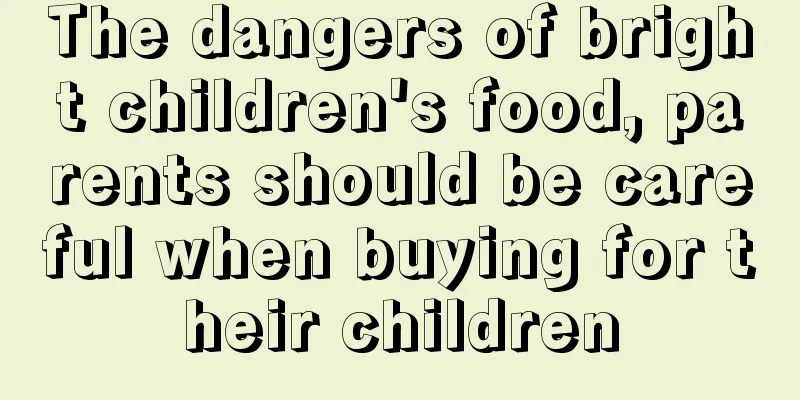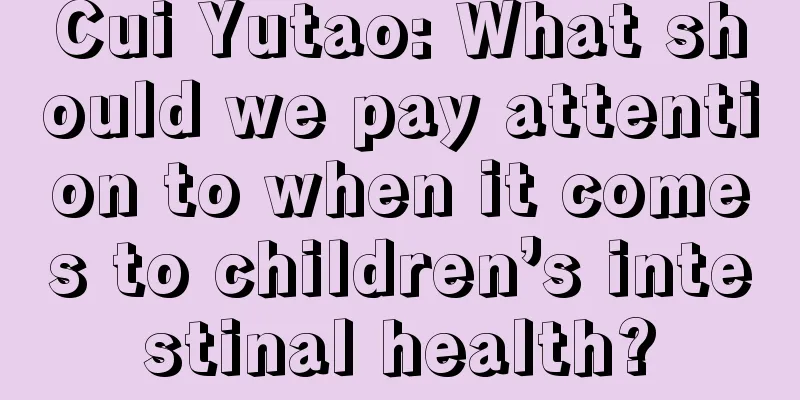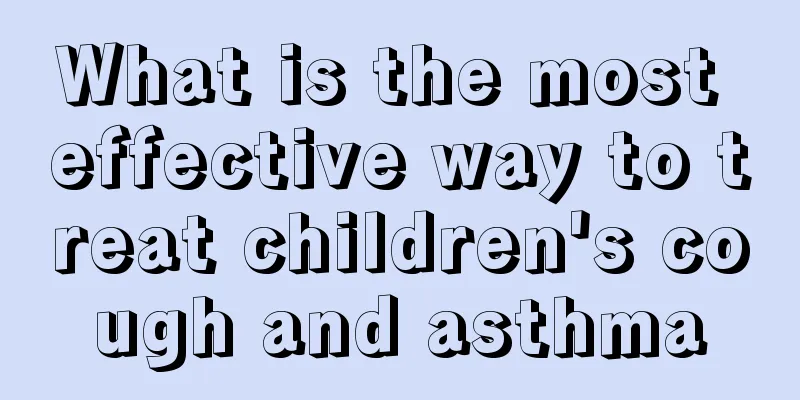The dangers of bright children's food, parents should be careful when buying for their children

|
Food safety is not only important for adults, but even more important for children. Many parents do not understand the common sense of children's food safety, and unknowingly feed their children some bright-colored foods, causing their children to develop bad eating habits. After eating these bright-colored foods, children not only refuse to eat, but also have poor physical resistance and become irritable and restless. Therefore, bright-colored foods are harmful to children, and parents should keep them away. So, what are the hazards of bright-colored children's foods? Let's take a look at the detailed introduction below. What are the dangers of colorful children's food? Nowadays, many families have only one baby, so they are very obedient to the baby and buy whatever the baby wants. Indulging the baby's bad habits is actually harming the baby. Especially when the baby likes to eat some bright foods, parents should know how to refuse, otherwise it will endanger the child's health. So, what are the hazards of bright children's food? There are mainly the following hazards: 1. Cause metabolic disorders Long-term consumption of colored foods can consume detoxifying substances in the body, mainly damaging the subcellular structure of the body, interfering with the normal function of a variety of active enzymes, and affecting the metabolic process of sugar, fat, protein, vitamins and hormones, thereby leading to diarrhea, abdominal distension, abdominal pain, malnutrition and various allergies, such as rash, urticaria, asthma, rhinitis, etc. 2. Lead to chronic poisoning Children are in the stage of growth and development. Their liver's detoxification function and kidney's excretion function are not sound enough and are weaker than those of adults. Therefore, if colored foods are consumed for a long time, the pigments will slowly accumulate, leading to chronic poisoning and affecting the healthy growth of children. 3. Affect nerve function Studies have found that many children are willful, bad-tempered, and often exhibit extreme behaviors. In addition to social factors and family discipline factors, excessive consumption of dyed foods is also a factor that cannot be ignored. Children are in the growth and development period, their organs are fragile, their nervous systems are not yet fully developed, and they are particularly sensitive to chemical substances. If they eat too much pigmented food for too long, it will affect the impulse conduction of children's nervous system, which can easily cause symptoms such as hyperactivity, emotional instability, inattention, poor self-control, strange behavior, and loss of appetite. Therefore, when parents buy food for their children, they should pay attention to the intake of colored foods and avoid eating too much or for too long, so as to avoid excessive accumulation and poisoning in the body, which will affect children's growth and development. 9 common sense about children's food safety that parents should know
1. Boiled water is the best drink for children Drinking boiled water not only meets children's physiological needs for water, but also provides them with some minerals and trace elements. Whether it is carbonated drinks, nutritional and health drinks, or purified water and mineral water that many families are currently keen on, they are not suitable to replace tap water as the main drinking water for people. When boiled tap water cools down to 25-35 degrees Celsius, the biological activity of the water increases, making it most suitable for human physiological needs. Children, because of their rapid metabolism, require more water than adults. At the same time, their kidney function is not perfect. Therefore, a lack or excess of water, minerals and trace elements will affect their health. Children who are used to drinking beverages instead of water often have poor appetite, hyperactivity, bad temper, and are short and underweight. 2. Frequent and large amounts of cold drinks are harmful to children's health Letting children eat 4 or 5 ice creams or drink 2 or 3 bottles of soda at one time is very harmful to their health. First of all, the human body's gastric acid secretion decreases in summer and the immune function of the digestive system declines, while the climatic conditions at this time are just suitable for the growth and reproduction of bacteria. Therefore, summer is a season when digestive tract diseases are prone to occur. Excessive consumption of cold drinks can cause a sudden drop in temperature in the gastrointestinal tract of children, slow local blood circulation and other symptoms, affecting the absorption and digestion of nutrients in food, and may even lead to digestive dysfunction, nutritional deficiencies and frequent abdominal pain in children. In addition, some products in the cold drink market have very poor hygiene conditions and many products do not meet hygiene standards. In this case, excessive consumption of cold drinks will increase children's chances of developing digestive system diseases. 3. Canned drinks are harmful to children The soda cans that are so popular among children are made of aluminum (AL) alloy. To prevent the aluminum alloy from coming into contact with beverages, its inner layer is coated with an organic coating for isolation. During the production process, some manufacturers fail to completely coat the can wall with protective coating, or the coating is damaged during capping, filling and transportation, which can cause the beverage to come into direct contact with the aluminum alloy and cause aluminum ions to dissolve in the beverage. A survey shows that the aluminum content in canned drinks is 3 to 6 times higher than that in bottled drinks. If you drink canned drinks frequently, you will inevitably consume too much aluminum. Excessive aluminum may cause decreased intelligence and abnormal behavior in children, and is not conducive to the development of their bones and teeth. 4. Eating jelly frequently is not good for children’s health
Most of the jellies sold on the market are not made from fruits, but are made from thickeners such as sodium alginate, agar, gelatin, carrageenan, and a small amount of artificial flavors, artificial colorants, sweeteners, acidifiers, etc. Although sodium alginate, agar, etc. are dietary fiber, excessive absorption will affect the absorption of fat and protein, especially it will cause inorganic salts such as iron and zinc to combine into soluble or insoluble mixtures, thereby affecting the body's absorption and utilization of these trace elements. 5. Long-term drinking of mineral water and purified water is not good for children's health The main difference between mineral water and tap water is that mineral water contains high content of certain minerals or trace elements, which have health benefits for specific groups of people. Drinking mineral water should be targeted, and it is best to supplement what you lack. For example, children with zinc deficiency may benefit from drinking high-zinc mineral water. On the contrary, if you are not zinc deficient and your diet provides sufficient zinc, there is no need to drink this mineral water. Long-term and excessive deposition of minerals and trace elements in the human body may cause certain diseases, the most common of which is kidney stones. Experts believe that at present, mineral water consumers are generally blind. Some parents do not understand that the ingredients of each type of mineral water are different and their health benefits are also different. Instead, they let their children drink mineral water as an ordinary thirst-quenching drink, blindly believing that mineral water is better than tap water. This is a misunderstanding. If children drink it all year round, it will have adverse effects on their health. As for distilled water, purified water, space water, etc., most products remove a large part of the minerals and trace elements in the water while removing industrial pollutants. Long-term drinking will inevitably lead to insufficient intake of certain minerals or trace elements in the human body, causing adverse effects on the body, and the impact will be greater for children who are in the growth and development period. 6. Colored soda is not good for children’s health
The main ingredients of colorful soda are artificial sweeteners, artificial flavors, artificial pigments, and carbonated water, which are made by adding carbon dioxide gas. Apart from a certain amount of calories, it contains almost no nutrition. The artificial sweeteners here include saccharin, cyclamate, acesulfame potassium and aspartame, etc. These substances are not absorbed and utilized by the human body, are not nutrients for the human body, are of no benefit to the human body, and excessive use is harmful to health. Those brightly colored sodas contain a lot of artificial synthetic pigments and flavors that can cause potential harm to children. Once excessive pigments and flavors enter the body of children, they are easily deposited on their immature digestive tract mucosa, causing loss of appetite and indigestion, interfering with the functions of various enzymes in the body, and causing adverse effects on metabolism and physical development. In addition, some colored popsicles, colored ice bricks, colored ice bags, etc., like colored soda, are harmful to children's development and have no benefits, so it is recommended not to consume them. 7. Children should not drink cola and coffee. A large number of studies have found that regular consumption of coffee and caffeinated beverages is harmful to children's health. Caffeine is actually a stimulant that mainly acts on the central nervous system, stimulating heart muscle contraction and accelerating heartbeat and breathing. If children drink too much caffeine, they will experience symptoms such as headache, dizziness, irritability, rapid heart rate, and rapid breathing. In severe cases, it may also cause muscle tremors and shaking hands when writing. Caffeine is an irritant that can stimulate gastric motility and gastric acid secretion and cause intestinal cramps. Children who drink coffee frequently are prone to unexplained abdominal pain. Long-term excessive intake of caffeine can lead to chronic gastritis. Caffeine can dilate the capillaries on the gastrointestinal wall, which may affect children's bone development. At the same time, caffeine will destroy vitamin B1 in children's bodies and cause vitamin B1 deficiency. 8. Puffed foods are harmful to children’s health
French fries, snow cakes, potato chips, shrimp strips, shrimp crackers, chicken rings, chicken strips, corn cobs... are children's favorite puffed foods. Tests show that although puffed foods taste delicious, their ingredient structure shows that they are high in fat, calories, and low in crude fiber. From the perspective of dietary structure analysis, it has certain defects and can only be eaten occasionally. Long-term and excessive consumption of puffed foods will result in high intake of fat and calories, and insufficient intake of crude fiber. If you don’t exercise enough, it will cause fat accumulation in the body and lead to obesity. If children frequently consume puffed foods, it will affect their normal diet, resulting in the lack of guarantee and supply of multiple nutrients, and they are prone to malnutrition. Puffed foods are generally high in salt and MSG, which will make children more susceptible to high blood pressure and cardiovascular disease when they grow up. These are not conducive to the healthy growth of children. 9. Taking nutritional supplements frequently is not a good idea Parents believe that giving their children supplements will promote their growth and development, and they hope to improve their children's intelligence through it. Therefore, they will buy various nutritional supplements, such as those containing ginseng, deer antler, donkey-hide gelatin, cordyceps, pollen, etc. Little do people know that while these supplements may be beneficial and harmless to adults, they often cause many adverse consequences for children, such as decreased appetite and precocious puberty. Because these supplements contain hormones and trace active substances, they affect children's normal physiological metabolism. If the child is indeed weaker than other children, it is best to use the medicine dialectically under the guidance of a doctor. Do not give it to the child at will, otherwise it will only counterproductive. It can be seen how important children's food safety is. After understanding the hazards of harmful children's food, parents must pay attention to guiding their children to eat correctly. In fact, children are educated by their parents. If parents educate their children in different ways, the children will form different personalities and physical fitness, so parents must do a good job in this aspect. |
<<: How to help children overcome their fears
>>: Do parents pay attention to the causes of children's stuttering?
Recommend
Premature babies are
Premature babies are a huge burden to their famil...
Baby has diarrhea and low fever
Every change in the baby after birth is watched b...
What are the symptoms of appendicitis in children?
Appendicitis is familiar to everyone, and its hig...
How to treat children’s itching at night?
If a child feels itchy at night, he or she will b...
The symptoms of food poisoning in children are so serious
Because children have very poor ability to distin...
Symptoms of mental retardation
In the context of eugenics and good parenting, wh...
What to do if your child has no patience
The pace of social life and work is now relativel...
Why does a 2-year-old child sweat while sleeping?
If a 2-year-old child sweats while sleeping, it m...
Can white rash on children be cured?
Pityriasis alba is a skin disease that is more co...
What department should children go to for knee pain?
Since many parents do not care about their childr...
How many degrees of fever should I take antipyretics
It is normal for the body to have a fever, but ma...
Why do four-year-old children become sleepy?
Children need more sleep than adults, and if thei...
What vegetables can children with renal failure eat?
Although the living standards are constantly impr...
How to do sports training for children?
Children are a very important member of every fam...
Best treatment and prevention for eczema on baby's face
Many times due to weather changes, many children ...









